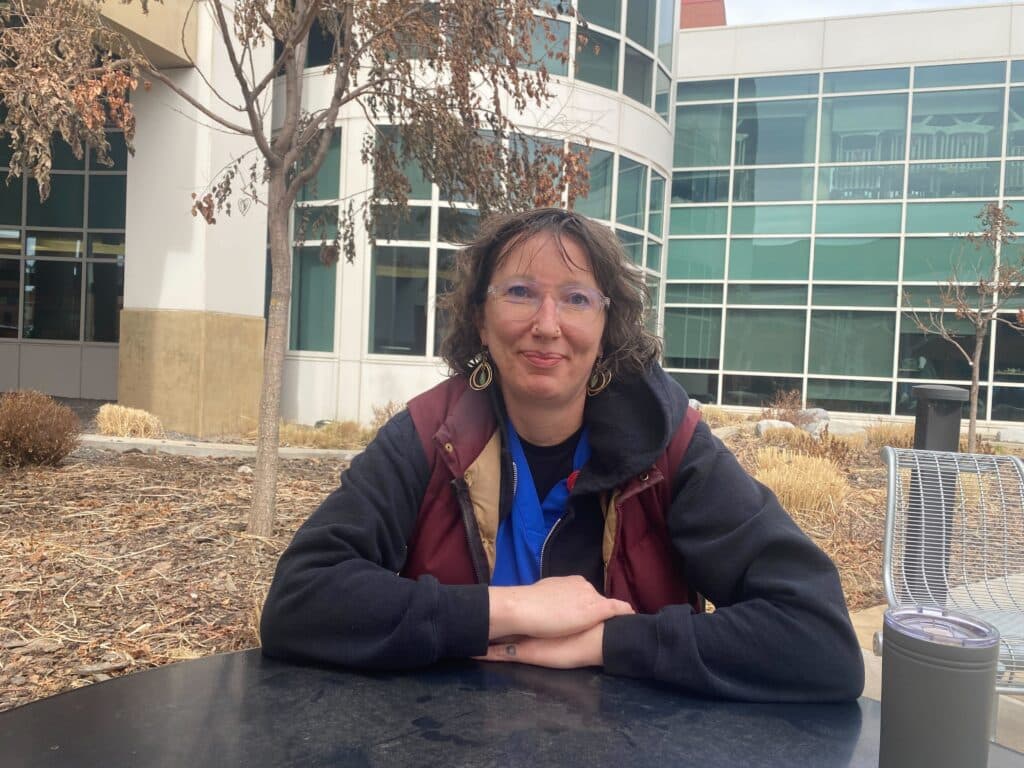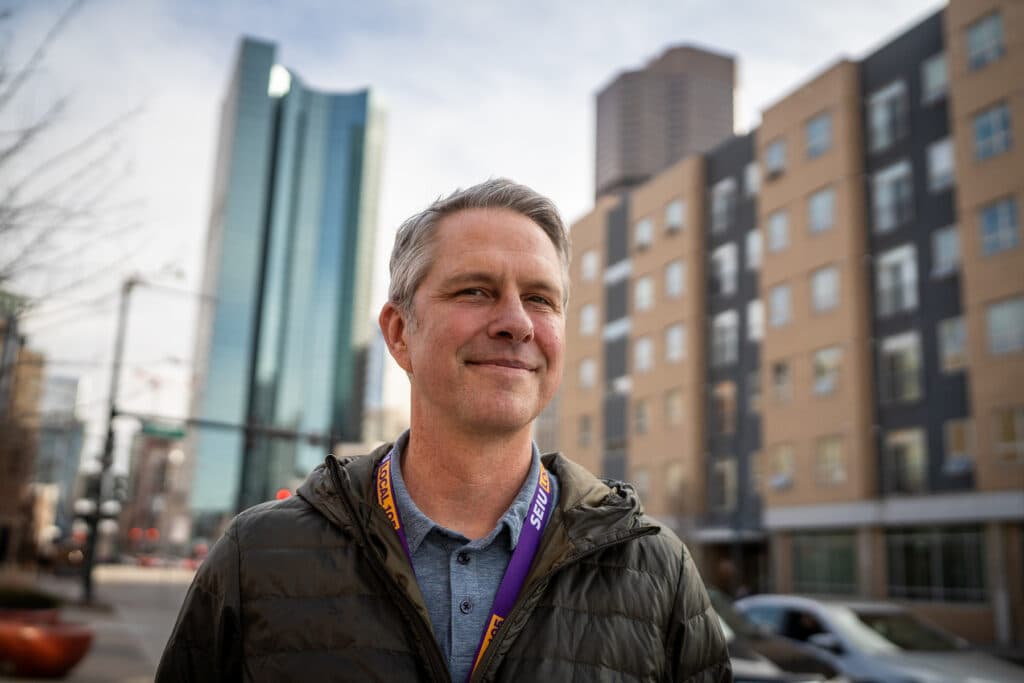Drew Mitchell, a case manager at the Colorado Coalitions for the Homeless, spends his days helping people experiencing homelessness access benefits and work toward housing stability.
After work, though, he says he goes home to figure out how he is going to pay rent and bills himself each month. He loves his work at the Coalition, but is unsure how financially sustainable the job is long-term.
“I really love this job, I really, really love my clients, I would love to stay here as long as I can,” Mitchell said. “But the reality of the situation right now is I can barely afford my rent. I'm looking at other organizations that pay me a lot better. I am struggling with my bills.”
Low pay and high employee turnover are two of the key reasons Mitchell is working with other Coalition staff to gather support for a union. On Tuesday, organizers at the Coalition formally announced their intent to form a union with Service Employees International Union Local 105 (SEIU), though they are holding off on an official vote while they build awareness and support.
The union push comes after staff at Urban Peak, an unhoused youth shelter in Denver, voted to unionize in July of 2023, becoming one of the first unions at a homeless services provider in Colorado.
In a statement to Denverite, Coalition spokesperson Alexis Whitham said that leadership is aware of the organizing, but she did not indicate how the organization might respond to a potential vote.
"We have yet to receive information about any bargaining unit or proposal specific to CCH," she said.
Fisher said the Coalition has faced a number of struggles, including an increase in uninsured patients, flat federal funding and growing homelessness in Colorado.
"We are acting on employee feedback and prioritizing investments to improve retention and engagement," said Coalition CEO Britta Fisher. "What brought me back to the Colorado Coalition for the Homeless is our mission and the 800 plus people dedicated to work on this mission. I am committed to continue collaborating with our staff, our clients, and our community to advance and fulfill our mission."

Staff at the Coalition say high employee turnover does not only affect employees. It also impacts the quality of care clients receive.
Zoey Palmer, a nurse with the Coalition, grew up in Denver and experienced food and housing insecurity herself. She said she had always wanted to work at the Coalition, but that a revolving door of staff hurts clients and is expensive for the nonprofit.
“Stability and building strong relationships is the biggest support that we can offer our clients when they have dealt with so much trauma and instability in their lives, and when case managers can't really stay for longer than six months, things get dropped with people's health, with people's housing situations,” Palmer said, adding that clients often stop engaging when case managers change.
These issues come as the Coalition is increasingly tasked with responding on the front lines of Denver’s homelessness and housing crises. In 2023, the organization received nearly $25 million in new contracts with the city to help run shelters and provide case management services to people experiencing homelessness.
Mitchell said a key moment that pushed him towards unionizing occurred when the nurse case manager on his team left. The role is still vacant, and Mitchell said that means sick clients are not getting medical care they need.
“Turnover kind of fuels turnover too, because when you're losing your team and you're understaffed, the amount of work that you have on your plate is significantly more,” he said.

Organizers said they hope a union would give workers a seat at the table in figuring out how to increase pay.
Union leaders want the Coalition to be more competitive with peer organizations to decrease turnover and make the jobs more feasible. Mitchell said that many staff members qualify for the same benefits as their clients, leading people to leave the Coalition for peer organizations with higher base pay.
According to the Coalition’s job postings, a case manager role for someone with a bachelor’s degree starts at $20.64 and goes up to $25.14 per hour. At Urban Peak, a similar role pays $24.02 per hour, and at WellPower a case manager with a bachelor’s degree earns $27.85 per hour, with the potential to earn an extra $1 to $2.50 for Spanish or American Sign Language skills.
Todd Kaanta, who has also been actively organizing at the Coalition, has worked there as a case worker for six years. That’s a long time for Coalition staff to stick around, according to Kaanta, who is the last remaining original member of his 11-person team. Part of the reason why Kaanta said he’s stuck around is that he joined the organization with more work experience, so he was hired above base pay.
“[Turnover] is the chief complaint I hear from clients,” Kaanta said. “I think that when the workers come to the table on more of an equal footing that the issues get heard a little differently, and I’m really hoping that we can help management out in that way.”
Fisher, the organization's CEO, said the Coalition gave out employee bonuses and cost of living adjustments this year. Coalition spokesperson Whitham also said the nonprofit increased paid leave this year and plans to undergo a compensation analysis looking at market data.
"We continue to work with funders and the local, state, and federal government to recognize the importance of the work being done in community healthcare, homelessness services, and affordable and supportive housing so we can continue to support staff through efforts to increase wages," she wrote in an email to Denverite.
The organizers see themselves as part of a larger union push across social workers in Denver, and as part of a resurgent labor movement nationwide.
Both Urban Peak and WellPower staff are unionized. Mitchell said he hopes that by unionizing Coalition staff, workers at homeless shelters across the city can have more bargaining power to raise pay and working conditions across the board.
“There's a big union push and social work in Denver right now,” he said. “If we all can be unionized and kind of band together and all have that bargaining power, we can really have a lot more say on how our jobs are, and do what it takes to make them better.”
Organizers said that about 30 percent of eligible workers have signed union cards, which is enough to hold an election. But they want to spend the next few weeks raising more awareness and gathering support before filing for an official election, which workers don’t have a date for yet.
Mitchell said that the union’s slogan is “We want to stay.”
“This is hard work. We're bearing witness to people's trauma, and we're caring for people that are struggling most in our society. That's gonna be a difficult job, no matter how you look at it,” he said. “But I do deeply believe that there are ways to make it better.”













